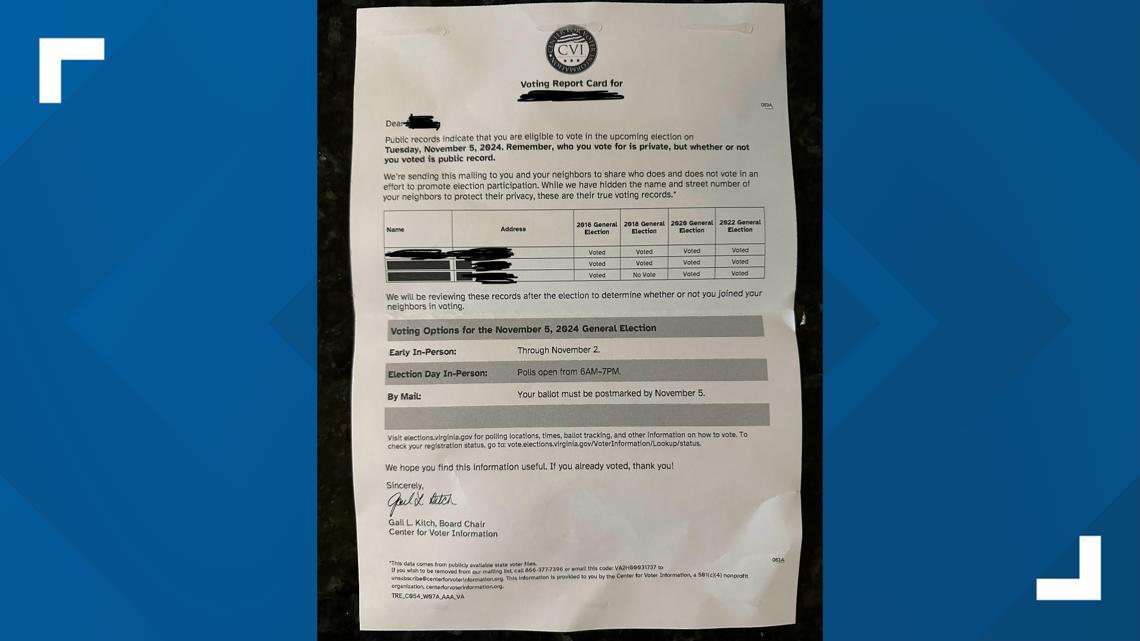The letters allegedly expose the voting history of individuals who may or may not have voted in each of the last four elections.
WASHINGTON — Voters in parts of the DMV were surprised and concerned after receiving letters breaking down their and their neighbor's voting record in past elections. Now, the Maryland Attorney General stepping in to put a stop to the operation.
On Thursday, Attorney General Anthony G. Brown issued a cease and desist letter to the nonprofits behind the letters, the Voter Participation Center and Center for Voter Information. Both organizations are located in D.C.
The cease and desist orders the nonprofits to immediately stop sending the letters to Maryland voters, which Brown's office said threaten to publicly expose those registered voters who choose not to vote in this year's election. Additionally, the organizations are ordered to refrain from sending "threatening communications" in the future and must agree not to follow through on threats to embarrass nonvoters by publishing that information to their neighbors.
“Voting is among the most important rights that Marylanders have. Any action that intimidates prospective voters, especially on the eve of such a consequential election, will not be tolerated,” said Attorney General Brown. “Let me be clear: these unnerving letters are unacceptable, and Maryland voters should know that their decision to vote this Election Day is entirely theirs to make.”
WUSA9 first reported the letters, which claim to be "Voting Report Cards" on Wednesday. The letters expose the voting history of individuals who may or may not have voted in each of the last four elections. Underneath a chart with voting records, the letters say, “We will be reviewing these records after the election to determine whether or not you joined your neighbors in voting.”


Since the letters don’t tell people to vote or who to vote for, and they’re using publicly available information, the mailings are technically legal. The information regarding whether a person voted or not is available in Maryland if a person requests to receive a copy of the voter registration list with election participation history included.
"Maryland law prohibits, however, conduct designed to 'influence or attempt to influence a voter’s decision,' whether to go to the polls to cast a vote, or vote by other lawful means, 'through the use of force, fraud, threat, menace, intimidation, bribery, reward, or offer of reward,'" OAG said in a press release.
The Office of the Attorney General (OAG) said Thursday that it and the State Board of Elections (SBE) have received multiple complaints regarding the letters.
"Recipients of these communications from the CVI are being led to believe that, if they choose not to vote, that decision will be published to their neighbors," OAG said in a press release, adding that the people they spoke with described feeling intimidated, threatened, and shocked.
"This threat to publicly expose the recipient’s voting record violates both Maryland and federal laws," said OAG.
WUSA9 spoke with some of the recipients Wednesday some of whom were upset but others were even more concerned that the letters were wrong.
“It said that I had not voted in 2020, which I absolutely did vote,” said one Maryland voter who wished not to be identified.
Hours before the cease and desist was announced, WUSA9 spoke with CEO and president of the two non-profits, Tom Lopach, who said they've been sending letters like these for over a decade.
"We found that they are the most effective tool in increasing voter turnout," Lopach explained.
He said the groups run randomized control trials for all of the programs, including the voter report cards, and tested several different letters over the year. Overall, Lopach said the goal of the letters is to help register voters and increase voter turnout.
"At the end of the day, as an American, what we want is a robust election with everybody turning out so our representation is based on the people who are voting," he said.
As for the people who find the letters objectionable, Lopach had a simple solution.
"I'd encourage them to simply recycle the letter and get out and vote."
.png)









 English (US) ·
English (US) ·